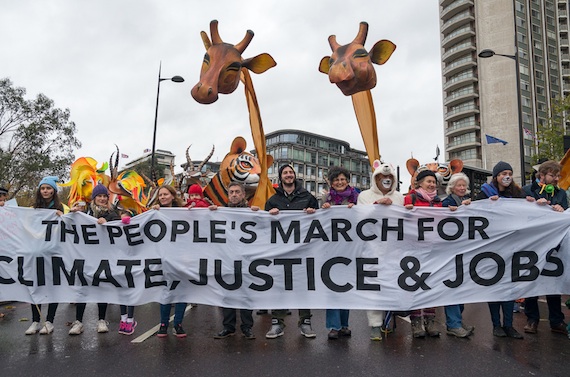Leaders and negotiators from 195 countries passed a climate change resolution in Paris on Sunday that aims to limit the increase in global temperature to 2 degrees Celsius with a goal of 1.5 degrees. The final agreement is available here.
A week before the climate talks in Paris, I read a devastating article suggesting that COP21 would be “too little, too late.” The planet is burning, sea levels are rising, and species are going extinct at an alarming rate. What’s more is we’ve created these problems ourselves and it’s likely too late for us to fix them.
This grim message brought to my mind a well-known poem by 18th century Japanese haiku master Issa:
This dewdrop world
Is but a dewdrop world
And yet—
This world is as fleeting as a dewdrop, Issa tells us, so don’t get too attached.
But I think even Issa was talking about the things in the world and not the world itself. Until now, our ancestors seemed to understand our individual human tragedies as happening with the backdrop of an ongoing living earth. We could console ourselves that—although we will each have our hearts broken and die—the next generation would carry the species forward while the earth continued to spin. Spiritual practice could even bring us into harmony with this larger cycle.
This ancient assurance is being undercut by our knowledge of climate change and the Sixth Extinction—the scientific idea that we are in the midst of the sixth mass extinction in history.
There are many who are showing us what it might look like to accept this new reality. Roy Scranton, who wrote Learning to Die in the Anthropocene, suggests that we need to learn how to die not just as individuals but as a civilization. Writer Paul Kingsnorth founded the Dark Mountain Project, a collective of writers and artists who tell stories that respond honestly to environmental collapse. And Allen Kanner, the co-editor of Ecopsychology, has suggested that the proper response to our current environmental moment “is to grieve, take responsibility for the devastation, make reparations, and ritualistically and any other way we can ask for forgiveness.”
And yet—
Even though I respect these voices I’m not ready to give up on the idea that we can turn this thing around. So long as there are scientists and science journalists out there who don’t think it’s too late, I’m going to continue to give them at least one of my ears. I don’t believe that the necessary changes are going to come from the politicians at COP21, but as it turns out they have agreed to a historic climate treaty. I’ll also continue to hold out hope that the rest of us will find ways to work together, creating changes from the ground up.
Because the truth is, even if it is too late, Issa’s “And yet” reminds me that grief and hope—even if that hope is closer to longing than expectation—are natural responses to devastating news in the dewdrop world.
Thank you for subscribing to Tricycle! As a nonprofit, we depend on readers like you to keep Buddhist teachings and practices widely available.
